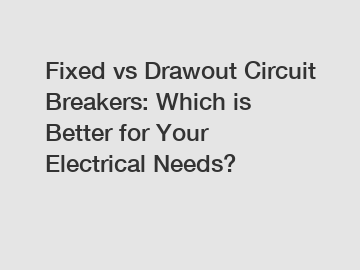Fixed vs Drawout Circuit Breakers: Which is Better for Your Electrical Needs?
When it comes to choosing the right circuit breaker for your electrical system, there are several factors to consider. One of the most important decisions you'll need to make is whether to go with a fixed or drawout circuit breaker. Both options have their pros and cons, so it's essential to weigh them carefully before making your final decision.
Fixed circuit breakers are installed permanently in a set position within the electrical panel. They are typically more cost-effective than drawout circuit breakers and are simpler to install since they don't require any specialized installation equipment. Fixed circuit breakers are also more compact, making them ideal for applications where space is limited.
Drawout circuit breakers, on the other hand, can be easily removed from the panel for maintenance or replacement. This feature makes drawout circuit breakers more convenient to work with since they can be removed without having to shut down the entire electrical system. Drawout circuit breakers also tend to have a higher fault rating than fixed circuit breakers, making them more durable and reliable in high-demand environments.

So, which type of circuit breaker is better for your electrical needs? The answer largely depends on your specific requirements and budget constraints. For smaller, simpler electrical systems where space is limited, a fixed circuit breaker may be the most practical option. However, if you have a larger, more complex electrical system that requires frequent maintenance or upgrades, a drawout circuit breaker may be the better choice.
In terms of reliability, both fixed and drawout circuit breakers are designed to provide the same level of protection against electrical faults. However, drawout circuit breakers may have a slight edge in terms of durability due to their higher fault rating. If you anticipate high levels of electrical activity or surge events in your system, a drawout circuit breaker may offer added peace of mind.
When it comes to installation and maintenance, fixed circuit breakers are generally easier and more cost-effective to work with. Since they are permanently installed, there is less risk of accidental damage during maintenance or repair procedures. Drawout circuit breakers, while more convenient for maintenance, require specialized equipment and training to safely remove and replace.
Ultimately, the decision between fixed and drawout circuit breakers comes down to your specific needs and priorities. If cost and space constraints are your primary concerns, a fixed circuit breaker may be the best option for you. On the other hand, if ease of maintenance and durability are your top priorities, a drawout circuit breaker may be the better choice.
Regardless of which type of circuit breaker you choose, it's essential to work with a qualified electrical professional to ensure that your system is installed and maintained correctly. Improperly installed circuit breakers can pose a safety hazard and may not provide the level of protection you need for your electrical system.
In conclusion, both fixed and drawout circuit breakers have their advantages and disadvantages. The key is to carefully consider your specific needs and budget constraints before making a decision. With the help of a qualified electrical professional, you can choose the right circuit breaker for your electrical system and enjoy peace of mind knowing that your system is protected and reliable.
For more information, please visit ring main unit for outdoor, lv switchgear, withdrawable circuit breaker.
223
0
0

Comments
All Comments (0)